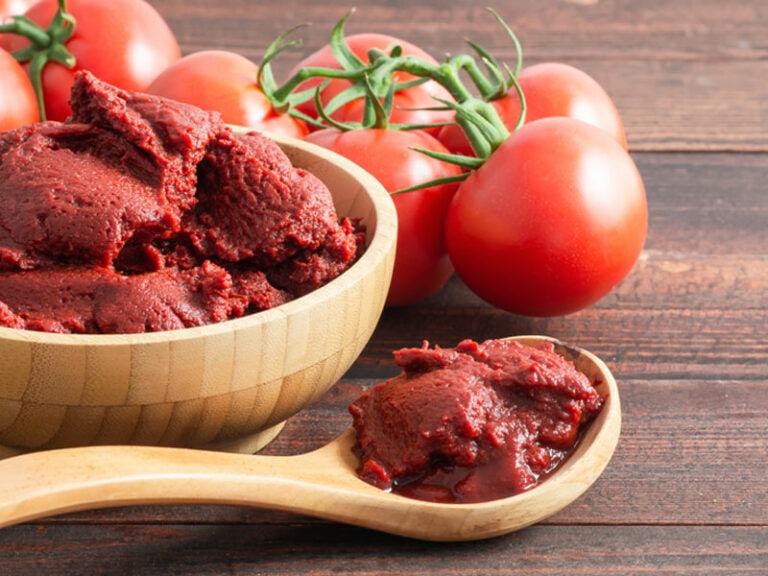If you have never worked in a commercial kitchen, you may find it hard to follow the kitchen slang phrases people use to communicate with each other. The language of chefs and staff may sound foreign to most newcomers without prior preparation.
To pursue a professional career in a food service establishment, you must learn the glossary of everyday kitchen slang. That’ll help you adapt to the fast-paced working environments of a commercial kitchen. Let’s begin the crash course of kitchen slang phrases without further ado.
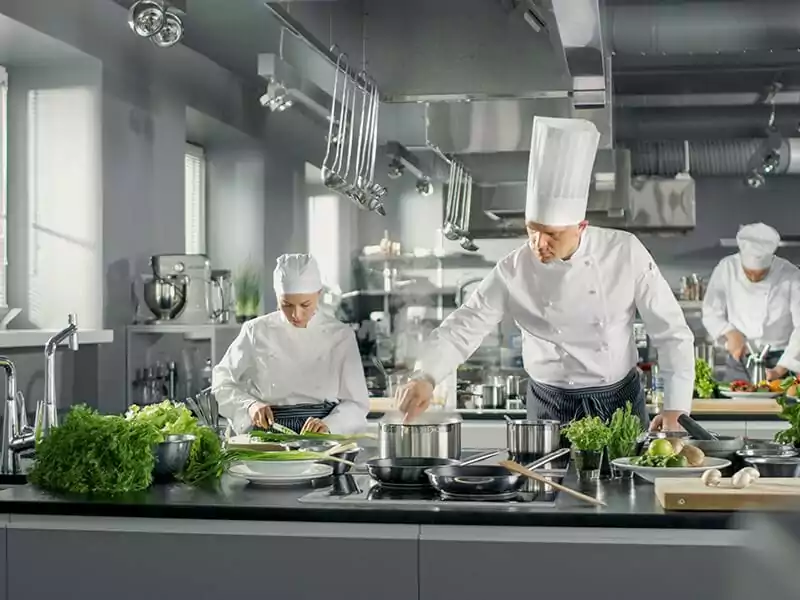
Brief History Of Kitchen Slang
Kitchen slang or kitchen lingo is a kind of tailored language used by cooks, chefs, and other staff in commercial kitchens to assign tasks or refer to specific items or people. There are many variants of terms with similar meanings created by individual establishments.
Most slang is the essence of decades of working in the field. They are clever, efficient, a bit crude, and sometimes humorous. It not only helps transcend the solidarity among people in the workplace but also cuts down on time wasted on communication.
This kind of lingo originated from the servers in the 1870s and 1880s. It has been an effective mnemonic device for short-order cooks. It became most popular from the 1920s to the 1970s.
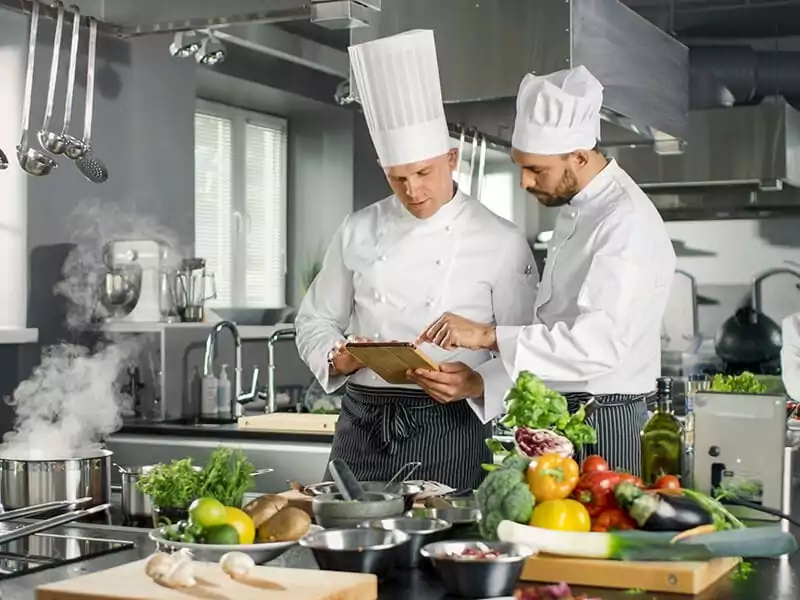
The Detailed List Of Kitchen Slang Phrases
The unique glossary used in the kitchen is profound and never stops adding more. Here are the most popular phrases to use in a daily kitchen environment:
Slang For Orders And Order Conditions
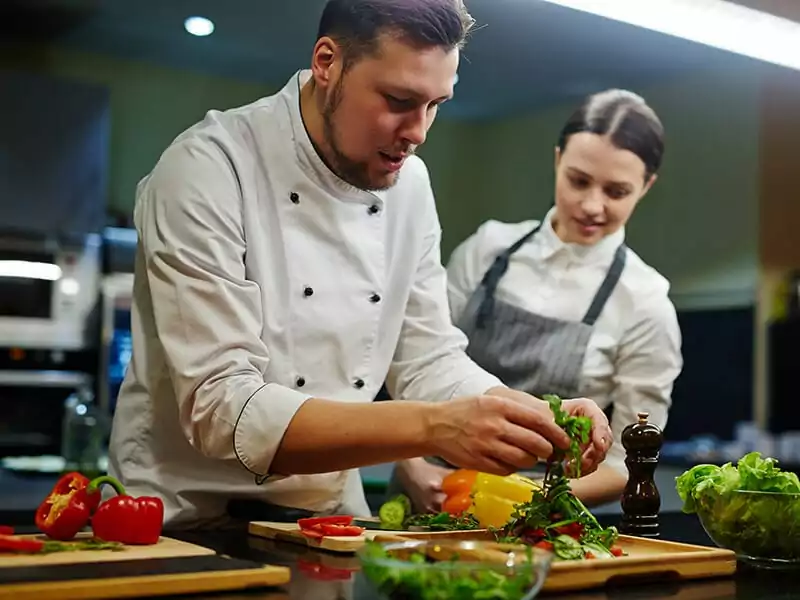
Customer orders are mostly encoded into slang. Some of them may sound familiar to you; some are like they’re from an alien language. Here is the list of the most used slang:
Adam And Eve On A Raft
It is interesting slang referring to two poached eggs on toast. The server can add “and wreck ‘em”, meaning the customer wants scrambled eggs.
Ex: “Table 3 ordered Adam and Eve on a raft with extra Hollandaise sauce.”
Angels On Horseback
These terms mean oyster wrapped in bacon. The dish is served with bread or canapé. People often mistake this dish for devils on horseback, which uses fruit like prune or dates.
Ex: “We are running out of bread for the angels on horseback. Someone tells the chef about this.”
All Day
The total amount of food or the incoming orders at a particular time. A chef will gather all the tickets, shout out all the orders, and end with “all day” so that each station knows its tasks.
Ex: “5 hot dogs and 2 nachos all day.”
À La Minute
It means “at the minute” in French. It is a customer note to order a fresh serving instead of a part of the pre-made large batch. They don’t want to eat food prepared in advance.
Ex: “Get the ingredients ready. We’ll make à la minute Soupe de Poissons for your special guest.”
Dead Plate
It refers to underqualified foods that are unservable. The cause can be the food being cold, overcooked, or misused ingredients.
Sometimes it’s because the customer sent it back or servers forgot to serve it. Whether cooks and servers can eat this or not depends on the restaurant’s rules
Ex: “Gotta make another dish, son. You burned it into a dead plate already!”
Dying On The Pass
This implies a dish in the queue for serving for too long and about to become a “dead plate”. Some dishes even need reheating before serving.
Ex: “Has Jeff gone to the toilet again? This dish is rotting and dying in the past there!”
Early Bird Special
This term describes a special deal of a cheap meal that comes in limited amounts for people who arrive early when the restaurant has just opened.
Ex: “Let the customers know that today’s early bird special is omelet and fries.”
On Deck/ On Order
This means “This order is coming up next”. Cooks call out new orders on the ticket to let the staff know what orders are in the queue. They also call out the server to inform them that the following order is ready to serve.
Ex: “Hey boys! Chicken lasagna is on deck. Don’t go just yet.”
On The Fly
An emergent order that took too long to make and needed executing at once. These situations happened when the server forgot the orders or lost the tickets.
Ex: “Flash this chicken for me. It’s on the fly for table three!”
GBD
Golden Brown Delicious (popular and arguably the best way to cook fried foods).
Ex: “Table three’s ordering GBD special fish fingers.”
SOS
Shorten for “Sauce on the side”, which means the customer orders a side dish of sauce separate from the rest of the main dish.
Ex: “They want that steak SOS.”
Mains
The main course of the meal. Dinner consists of many courses, including an appetizer, a main dish, and a dessert. A full-course dinner may range from 3 courses to 12 courses.
Ex: “The mains are on deck, Jeff.”
Comp
Short for complimentary, which means giving away a dish as a part of advertising, a gift for a VIP, or an apology for a complaining customer.
Ex: “Take this to table five as a comp. Tell him the chef is sorry for the long wait.”
Pittsburgh Rare
It refers to food burnt outside, rare inside. It’s like searing, but the customer can choose the degree of rareness and how well done the outside of the steak is. This term is popular in the Midwest and Eastern Seaboard of America.
This dish comes with another term, such as Chicago-style or black and blue.
Ex: “Table six wants their steak Pittsburgh rare.”
Learn about kitchen hierarchy in a commercial kitchen.
Slang For Staff, Customers, And Other People

People have invented many clever sayings to infer people and specific types of customers. Check out the list below to find out:
Early Bird
Primarily refers to the elder or tourists who want more service and extra food without spending more.
Ex: “This is the third time those early birds ask for more sauce.”
Redneck
People who don’t tip. It has nothing to do with rural types of people. In America, leaving a service establishment without tipping the people who served you is rude.
Ex: “So those rednecks just walk out without sparing a dime.”
The Boogie Man
It means the health inspector. The health inspector pays a visit every 6 months to inspect the health and safety standards of the restaurant.
Ex: “Mop the floor and throw all the spoiled ingredients now! The boogie man is on his way here.”
Expo
Expo, or Expeditor, is the person who reads the orders aloud to the staff and finishes the dishes by adding spices and herbs. They are also responsible for fixing the dish’s presentation before serving it.
Expo can be anyone from servers and hosts to managers. They check up and manage many things to ensure the food is punctually well-made.
This person is like the bridge between customers and the kitchen. They can pick up food and run it themselves or give it to servers.
Ex: “We need a guy familiar with being an expo. We’re going big tonight.”
Runner
Mostly refers to servers and sometimes managers, who pick up food from the kitchen and bring it to the right table. In a busy restaurant, anyone can be a runner if they are idle at the moment.
Ex: “You have one job as a runner, and you failed it miserably, Jeff.”
Bubble Dancer
It’s a disrespectful and humorous way to address the dishwasher. Back in the day, the American soldier in WWII joked about burlesque dancers while washing dishes. Kitchen staff later adopted it to make fun of the lowest rank in the kitchen.
Ex: “Get your job done now, or I will make you a bubble dancer for a day.”
Campers
Customers that hang out too long at the table, sometimes even past the closing hour. Usually, managers and servers dislike this type of person because they occupy tables and don’t yield any profit.
Ex: “We could have gone home without the campers on table three.”
Can’t Cook His/Her Way Out Of A Paper Bag
To criticize someone bad at cooking or describe a terrible cook or chef but still boasting about their skills.
Ex: “George should stop rambling about his baking talent. He can’t even cook his way out of a paper bag.”
Chef De Partie
It’s another name for station chef. In bridge systems, chefs are classified into many types, such as saucier, grillardin, etc. Station chefs are in charge of a specific station among various stations like fish, meat, saute, soup, vegetable, pantry, fry, pastry, and grill stations.
Ex: “You can never become a chef de partie with that working attitude.”
Commis
That means an apprentice under the chef de partie. They follow chef de partie to learn about tasks in a station and assist station chefs with easy tasks such as preparing ingredients, helping with deliveries, measuring ingredients, and preparing simple dishes.
Ex: “Take these commies under your wings, chef. Be patient with the new boys, won’t you?”
Learn about positions and roles in a commercial kitchen.
Items And Areas In The Restaurant
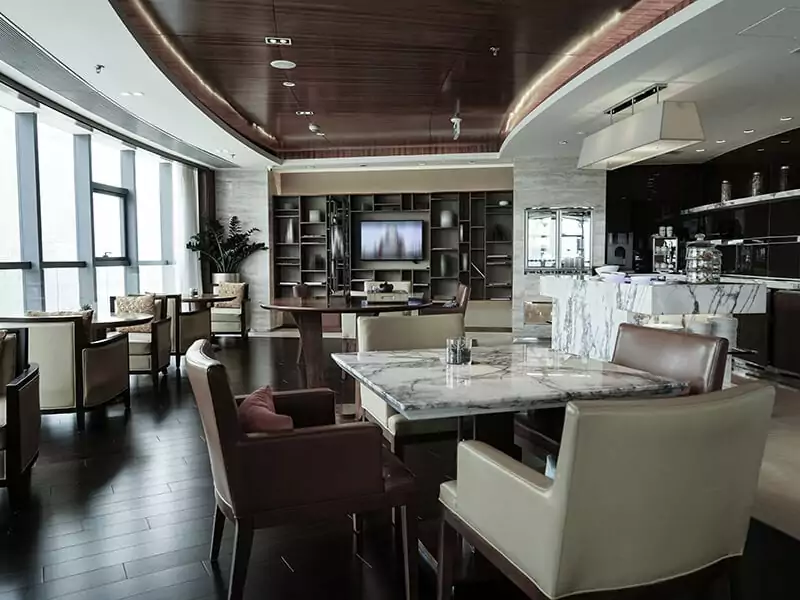
Even items and areas in the restaurant come with unique names. Read the list below to find out:
Back Of The House (BOH)
The back of the restaurant or the main working area of the restaurant where foods are being processed. It also includes storage rooms, cold storage rooms, dish pit, a wine storage room, and places that are the spine of the restaurant.
Ex: “Hey Jeff, get back to the BOH at once. We’ve got problems here.”
Deuce
Deuce means a dining table that seats 2 people.
Ex: “Put the “reserved” sign on that deuce, please.”
Chit
Chit means the order ticket that the kitchen gets from the table. Chits contain orders and special notes from customers.
Ex: “All the chits are clear! Good job, guys.”
Floor
The dining room. In some restaurants, staff has to abide by dressing and behavioral etiquette when entering the floor. Managers also sometimes show up on the floor to ensure all customers are satisfied with the services.
Ex: “The floor is full, Jeff. Get down here!”
On The Line
The line refers to the back of the dining room, where chefs and cooks work to make orders. The line includes the walkway, a counter or surface where chefs make foods, and various cooking equipment or racks of ingredients behind them.
To be on the line means working as a “line cook”.
Ex: “We are short of staff on the line tonight. It’s going to be a long night.”
Pass/ Window
The pass or window is the spacious surface where cooks place the finished orders, and these dishes are ready to serve. This is also where the expo does all the finishing tasks like plating, garnishing, and tidying up before serving. It’s an actual window in many kitchens.
Ex: “There are two orders on the pass. Why is no one picking them up?”
The Rail/ Board
It’s the place to hold the tickets. It’s a metal strip above the food window, and anyone on the line can read the order. Clear the rail means the kitchen has finished a large set of current orders.
Ex: “Clear the rail already! We’re going to deal with many incoming orders.”
Low Boy
Any under-counter fridge or freezer is a low boy, usually used to store ingredients. Low boys also offer a cooking surface on top of it. Chefs don’t have to go anywhere or turn around for ingredients because they are right under them.
Ex: “Get that steak out the low boy for me, won’t you?”
Walk-In
Refers to a large fridge or freezer so large that you can walk into them. Commercial refrigerators have to accommodate many ingredients for a long period – hence the size.
Ex: “The walk-in is full already.”
# Top/ # Top
It refers to the number of guests seated at a table. The host will inform the server working in that section how many tables have been sat for them to prepare. For instance, a table that can accommodate 5 people is a 5-top, and 6 people is a 6-top.
Ex: “Seems like the 2-tops are full. There are only 6-tops left.”
Cambro
It’s a large plastic pan used for storage. This term is also the name of the trademark of the Cambro Manufacturing Company.
These containers are favorite among kitchens because they are durable and easy to stack. Staff uses them to contain flour, sugar, and other staples.
Ex: “Put all these veggies in the Cambro for me.”
Slangs For Tasks And Requests
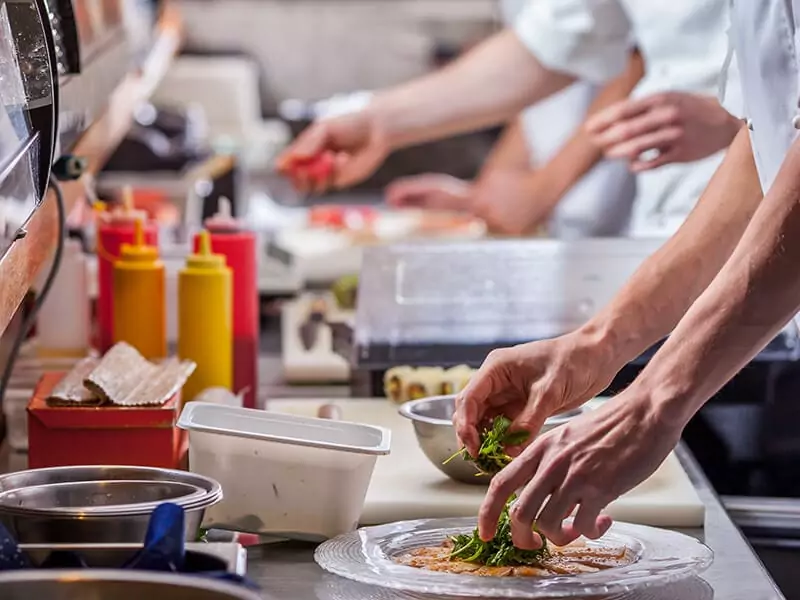
There are countless tasks in a commercial kitchen. Every position must work harmoniously to cater to customers’ best foods and services. Slang helps a lot in saving time for communication.
Cremate It/ Kill It
To intentionally overcook something to the point of near burning or extra well done. This is usually a particular order from some guest.
Ex: “Kill that steak; table five wants it that way.”
Covers
It’s the total number of customers that you have to serve at that specific time. The manager uses this number to estimate the number of customers for the next shift. That figure is helpful to calculate the sale per cover too.
Ex: “Brace yourself, gentlemen. The covers next week will be off the chart since there will be a musical fest near our place.”
Fire
Fire an order means an order will be executed immediately and ready to serve soon. Sometimes orders are fired right when they reach the kitchen; sometimes, the chefs will halt the orders until customers have finished or nearly finished their current dish.
That’s to avoid the new dish being ready when customers haven’t done with the current one.
Ex: “Fire the next dish now! The guests are finishing their main course anytime soon.”
Flash
The food needs heating, and the cooks need to reheat it quickly (flash) on the charbroiler. This is because the dish is cold from sitting on the window or undercooked.
Servers and expos are the ones who assess the condition of the dishes and request further measures.
Ex: “Chef, this plate has been sitting on the window for a while. Can you flash it for me, please!”
Waxing A Table
To give a table special service. This treatment is often for VIPs like famous people, owner’s special guests, or generous tippers.
Ex: “Make sure you wax that reserved table. The mayor’s family is dining here tonight.”
86
When ingredients for a dish are running out, the item needs to be taken off the menu. This also happens when the chef finds that the ingredients don’t meet standards or are underprepared.
Chefs will inform the server to spread the word to customers before they order more of that dish.
Ex: “86 all the chicken breast dishes. Something is wrong with the chicken.”
Drop
This means to start cooking the accompanied item when the main dish is almost ready. “Drop” also means to bring the bill to customers for payment.
Ex 1: “Drop the French fries now; the burger is almost ready.”
Ex 2: “Drop the cheque on table five for me.”
Sacked
This means an employee gets fired from the job. Usually, only the head chef and the manager can make this decision.
To get sacked, a staff has to have messed up many times, like delivering the wrong dishes to tables, misconducting in service, or underperforming in work.
Ex: “I will sack you if you keep messing up the orders, Jeff.”
Mise
Short for “mise en place”, which means everything in its place in French. It indicates that all the preparation and organization for each dish is ready, and the cooks can start cooking now.
The preparation includes washing, cutting, peeling, and grating your ingredients. This is the first lesson anyone must learn if they want to pursue a professional cooking career.
Ex: “Get everything mise, boy. The guests are coming soon.”
Run The Dish
This means delivering a plate to the customers. This is not an exclusive task of the server. When the restaurant is stuffed, anyone free will have to run the dish if there is an order on deck.
Ex: “Someone run this dish already. It’s getting cold in here.”
Running The Pass
Refers to the cook responsible for letting others know the orders. Sometimes, cooks in the line are too busy to deal with all the orders accurately, so it’s crucial to have someone operating the station and giving orders to other cooks.
This person works closely with the expo to ensure the orders’ exhibition is correct before delivery.
Ex: “Jeff, you are running the pass tonight. Make sure everyone hears you alright.”
Stretch It
To utilize the remaining amount of ingredients on something, especially when that ingredient is running out.
This is not ideal, and cooks should not abuse it because it risks losing the quality of the dishes. The best way to stretch an ingredient is by using a lesser amount in cooking.
Ex: “Can you stretch the sauce for the chicken? It’s not enough time to make a new batch.”
Burn The Ice
It means pouring hot water over the ice in the ice machine to dispose of it when the shift is over. This is one of the cleaning tasks in preparation for the next shift.
Ex: “Remember to burn the ice before leaving.”
Nuke It
This means microwave food. The way microwave radiation heats food inside seems like the activity of a nuclear bomb – hence the name. This request comes up when a customer finds the food is too cold to eat.
Ex: “Please nuke it for me. It’s dying here.”
Cryovaced
This term originated in French. It means removing air from a bag and then heat-sealing it to retain its freshness.
Ex: “We‘ve got to cryovaced this batch of meat and shove it into the fridge.”
Behind
This means “there is a person behind you” or “I’m behind you”. People say this to avoid collisions with other staff in a busy kitchen. You can say “hot behind” or “sharp behind” if you carry hot foods or dangerous equipment like a knife.
Ex: “Make way! Hot behind!”
Heard
When the order is coming, and the chef calls out to the cooks, they will say “heard” as they have heard and understood. Chefs usually have to remember a lot of orders and notes, so a simple word for confirmation is enough.
Ex: “Heard! You don’t have to remind me again.”
Learn how a chef manages a 3-Michelin-star restaurant kitchen.
Slangs For Restaurant Conditions
There is some slang for the staff to communicate about the restaurant conditions. Here are some of them:
In The Weeds/ Weeded
This phrase means someone is drowning in work and unable to deal with the condition at hand without help, especially when the kitchen is short of staff. This usually happens when a large table orders the same dishes from a station, like chicken or fish.
Ex: “We need more staff, boss. Everybody here is in the weeds most of the night.”
Getting A Push
Work in the kitchen tends to be never-ending. When the restaurant is busy, and the tickets start printing nonstop, the kitchen is “getting a push”.
Ex: “Get more men over here; we are getting a push.”
Double/ Volume Shift
When a staff, a waiter, or a cook works two consecutive shifts in a row. This happens when a restaurant is short of staff and employees have to work overtime. People also call it a “volume shift”.
Ex: “I’m burned out from taking a double last night.”
Food Cost
The actual amount of expense of a dish compared to the profit they gain when that dish is sold. Most restaurants operate with 30-40% food costs.
Ex: “We will not cut down the food cost. We have to serve the customers the best foods.”
Table Turn
This term is important for servers. It refers to an entire process from seating customers to getting the check. Servers don’t want customers hanging out too long after their meal because the more the table turns the serve, the more tips they’ll receive.
Ex: “I have served 5 table turns within 2 hours.”
Understanding Kitchen Slang Is A Survival Skill In Any Kitchen
New kitchen slang will never stop multiplying with the incredible growth of the food service industry. It’s nearly impossible for anyone who wants to work in a professional kitchen without some knowledge of kitchen lingo.
Understanding this slang will help you adapt to restaurant culture and go a long way in whatever your position.
Before you leave, let me know some of the slang you learn from local restaurants in the comment. Remember to like and share these articles with friends interested in how the chefs communicate.





